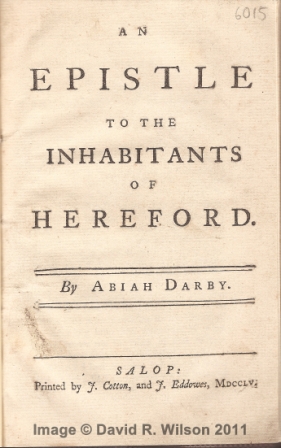Abiah Darby [née Sinclair, née Maude]
(1716-94)
Abiah Darby, a descendant of Henry III, was a Quaker minister, preacher, and evangelist, and the wife of the iron master and industrial leader, Abraham Darby II (her second husband), whom she married in 1745. Mrs Darby lived, as did the majority of the Madeley Quakers, in Coalbrookdale. She kept a journal from the 1740s, the maunscript of which is held by the Library of the Society of Friends (Friends House), London. It is from this journal and the letters between her and John and Mary Fletcher that we know of their interactions both social and religious.By the time of John Fletcher's arrival in the parish, she was already an active proponent of Quakerism. She, like her husband, was well-connected, establishing, visiting, and supporing Friends meetings in surrounding parishes, including Shrewsbury, Broseley, and to the south in Bristol, from where Abraham Darby I had originally come to Madeley. In October 1760, the same month Fletcher was inducted to Madeley, Abiah took a journey to Hereford where she sought an audience with the Bishop, James Beauclerk. She had published a letter to the inhabitants of that place in 1755, and she authored several other works in the 1760s. Her journal reveals day-to-day life and minsitry, recording visits from friends and family, daily chores, events related to the iron trade, letters received and written, memorable moments like special meals, and travels for minsitry or business.
Her first encounter with Fletcher was a visit he and some parishioners made to her Meeting in January 1761, and event she recorded in her journal:
'John
Fletcher, Parson of Madeley here [i.e. Coalbrookdale] with several
others, he asked us several questions relating to our principles ... we
lent him seeral books.' (Abiah Darby, MS Journal)
Fletcher was seeking to understand their doctrines rather than to confront them at this point, and the following month Abiah recorded that a month later he returned the books he had borrowed and reputedly 'confessed to the truth of our [i.e. Quaker] principles & that our friends were greatly inspired by the Holy Spirit.' In Septembeer, Fletcher, having heard that she was preaching a doctrine of justification by works, called on her in person to offer her the chance to confirm or refute the testimony. She denied even a hint of works righteousness to him. Indeed, she affirmed an Arminian view of the atonement, explaining the Quaker belief in the doctrine of justification of grace. Furthermore, and similar to the doctrines for which Fletcher was sometimes criticized, she explained that she was opposed to an antinomian gospel. Thus she taught her Friends 'to deny ungoliness and the worlds lusts, [and that] we should live ... Godlikely in the present world.'
She wrote to Fletcher a year later greeting him cordially, 'as thou hast always treated me with Candour, I have presumed to use freedom with thee ... I make free to say that I believe thou has been of service in the Lords Hand to reform the People hereaway; but it seems to me, they ought to be brought forward'. Throughout 1762 Darby and Fletcher had several interactions, including carrying on a correspondence in which they debated doctrines and disputed one another's teachings in their meetings. However, although some tensions did arise on a few occasions after 1762, the relationship between Abiah and her Friends and Fletcher and his churchpeople followed a pattern of conciliation throughout Fletcher's incumbency, paving a way for a degree of Evangelilcal concensus and joint effort in proclaiming the gospel. Upon hearing of Fletcher's death in August 1785, Mrs Darby wrote to Mary Fletcher that she believed he had been 'an eminent Instrument for good to this parish and a very Exemplary Patern of humility, Patience, self-denial and Piety ... I believe he acted up to the knowledge and discoveries revealed to him by the great Master.'
Although the extent of the relationship is not certian, it is clear that Mrs Darby and Mrs Fletcher were friends, and that respect was shared between them, perhaps as joint advocates for women's minsitry, both of them having written apologetics on the topic to defend their role as women preachers.
Abiah died in 1794 and is buried in the Quaker burial ground at Coalbrookdale.
References: Abiah Darby, 'Journal of Abiah Darby', MS 310, Library of the Society of Friends, London; idem, An Epistle to the Inhabitants of Hereford (Salop, 1755); idem, An Expostulary Address to All Who Frequent Places of Diversion and Gaming (London, 1765); idem, An Exhortation in Christian Love, to All Who Frequent Horse-Racing &c. (Shrewsbury, 1769); T. Auden, 'Early Quakerism in Shropshire', Transactions of the Shropshire Historical Society 5:2 (1915), 291-311; JF to Abiah Darby, 22 November 1764 (MARC); Abiah Darby to MF, August 1785 (MARC); H. M. Rathbone, ed. Letters of Richard Reynolds (London, 1852); David Robert Wilson, 'Church and Chapel: Parish Ministry and Methodism in Madeley, c. 1760-1785, with Special Reference to the Ministry of John Fletcher' (Ph.D. Thesis, University of Manchester 2010), 241-250.
Article contributed by David R. Wilson
